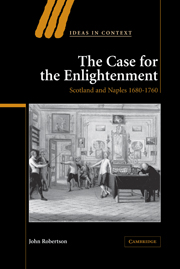Book contents
- Frontmatter
- Contents
- Preface
- 1 The case for the Enlightenment
- 2 Scotland and Naples in 1700
- 3 The intellectual worlds of Naples and Scotland 1680–c.1725
- 4 The predicament of ‘kingdoms governed as provinces’
- 5 Vico, after Bayle
- 6 Hume, after Bayle and Mandeville
- 7 The advent of Enlightenment: political economy in Naples and Scotland 1730–1760
- Conclusion: the Enlightenment vindicated?
- Bibliography
- Index
- IDEAS IN CONTEXT
Conclusion: the Enlightenment vindicated?
Published online by Cambridge University Press: 15 October 2009
- Frontmatter
- Contents
- Preface
- 1 The case for the Enlightenment
- 2 Scotland and Naples in 1700
- 3 The intellectual worlds of Naples and Scotland 1680–c.1725
- 4 The predicament of ‘kingdoms governed as provinces’
- 5 Vico, after Bayle
- 6 Hume, after Bayle and Mandeville
- 7 The advent of Enlightenment: political economy in Naples and Scotland 1730–1760
- Conclusion: the Enlightenment vindicated?
- Bibliography
- Index
- IDEAS IN CONTEXT
Summary
TWO CONTEXTS, ONE ENLIGHTENMENT
In the two very different ‘national’ contexts of Scotland and Naples, it has been argued, there emerged one Enlightenment. More precisely, there emerged in the two countries in the middle decades of the eighteenth century thinkers who saw themselves as members of a wider, European intellectual movement, dedicated to understanding and publicising the cause of human betterment on this earth. In both cases, the terms in which this objective was articulated were those of political economy. To Antonio Genovesi and Ferdinando Galiani in Naples, as to David Hume in Scotland, political economy furnished the concepts required to understand the economic and social predicament of their respective countries. At the same time, the arguments of political economy could be more or less freely aired in print, and thus set before a ‘public’ much wider than the narrow circles of rulers and their ministerial advisers who had hitherto monopolised the discussion of such matters, reserving them to ‘reason of state’. As a coherent intellectual discourse, even discipline (in the sense that it bound its exponents to certain forms of argument), which could also be addressed to the public at large, political economy supplied the terms in which the case for Enlightenment could be made both in Naples and in Scotland. In these two cases, it would seem, we do not need to follow John Pocock in supposing that different contexts fashioned plural Enlightenments.
- Type
- Chapter
- Information
- The Case for The EnlightenmentScotland and Naples 1680–1760, pp. 377 - 405Publisher: Cambridge University PressPrint publication year: 2005



